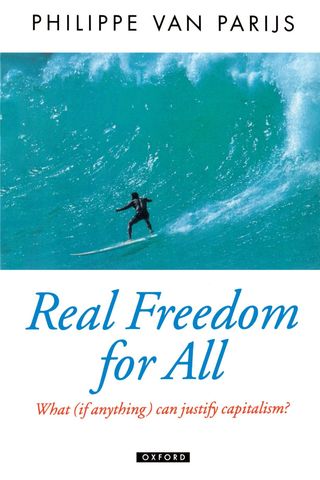
I recently posted a link to a thorough summary of the idea and history of universal basic income, over at Vox. I recalled that 14 years ago the Boston Review held a forum on Basic Income, following the arguments made by Phillipe van Parijs in Real Freedom for All. Van Parijs:
Advocates of a UBI may, but generally do not, propose it as a full substitute for existing conditional transfers. Most supporters want to keep–possibly in simplified forms and necessarily at reduced levels–publicly organized social insurance and disability compensation schemes that would supplement the unconditional income while remaining subjected to the usual conditions. Indeed, if a government implemented an unconditional income that was too small to cover basic needs–which, as I previously noted, would almost certainly be the case at first–UBI advocates would not want to eliminate the existing conditional minimum-income schemes, but only to readjust their levels.
In the context of Europe’s most developed welfare states, for example, one might imagine the immediate introduction of universal child benefits and a strictly individual, noncontributory basic pension as full substitutes for existing means-tested benefit schemes for the young and the elderly. Indeed, some of these countries already have such age- restricted UBIs for the young and the elderly. Contributory retirement insurance schemes, whether obligatory or optional, would top up the basic pension.
As for the working-age population, advocates of a universal minimum income could, in the short term, settle for a “partial” (less-than-subsistence) but strictly individual UBI, initially pitched at, say, half the current guaranteed minimum income for a single person. In US terms, that would be about $250 per month, or $3,000 a year.
More here. Responses from Herbert A. Simon, Emma Rothschild, Brian Barry, Anne L. Alstott, Fred Block, Katherine McFate, Gar Alperovitz, William A. Galston, Wade Rathke, Edmund S. Phelps, Elizabeth Anderson, Ronald Dore, Robert E. Goodin, Peter Edelman and Claus Offe can be found here. Herbert Simon:
I am in strong general agreement with Philippe Van Parijs’s argument for a UBI or “patrimony”–a portion of the product of a society that should be shared by all of those who inhabit that society. To establish such a patrimony is equivalent to recognizing shared ownership of a significant fraction of the resources, physical and intellectual, that enable the society to produce what it produces. As the essay makes a very strong case for the UBI and its feasibility, I will limit my comments to just two issues: (1) why a UBI (or patrimony) would be just; and (2) some problems of incentives that such a system poses and that need to be handled effectively.
Justice
When we compare average incomes in rich nations with those in Third World countries, we find enormous differences that are surely not due simply to differences in motivations to earn. Laziness is not a principal cause of poverty. A more plausible explanation for the differences, in fact the explanation that is universally put forward, is that much greater resources per capita are available to some countries than to others. These differences are not simply a matter of acres of land or tons of coal or iron ore, but, more important, differences in social capital that takes primarily the form of stored knowledge (e.g., technology, and especially organizational and governmental skills).
Exactly the same claim can be made about the differences in incomes within any given society. In large part, these differences must be attributed to differences in capital ownership, of which the largest part is social capital: knowledge, and participation in kinship and other privileged social relations. In addressing the question of justice, therefore, we are assessing the justice of inheritance of such resources along bloodlines. This is a question of value, not of fact. I personally do not see any moral basis for an inalienable right to inherit resources, or to retain all the resources that one has acquired by means of economic or other activities.
More here.
Sheri Berman at The New York Times:
